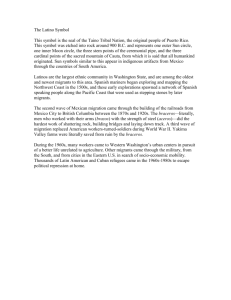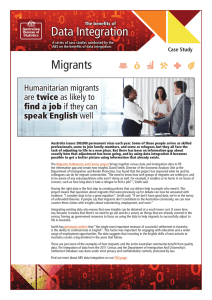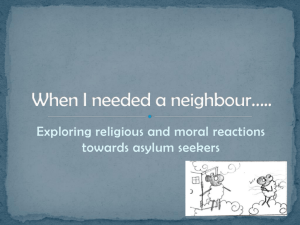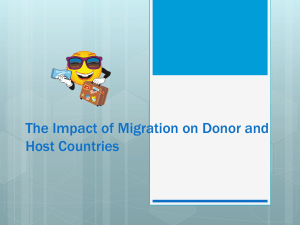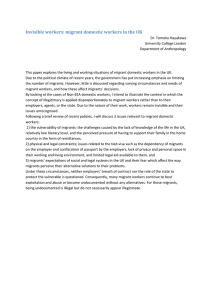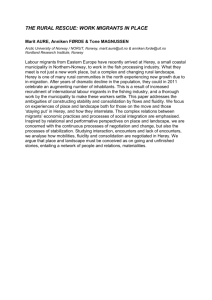Document 12649535
advertisement
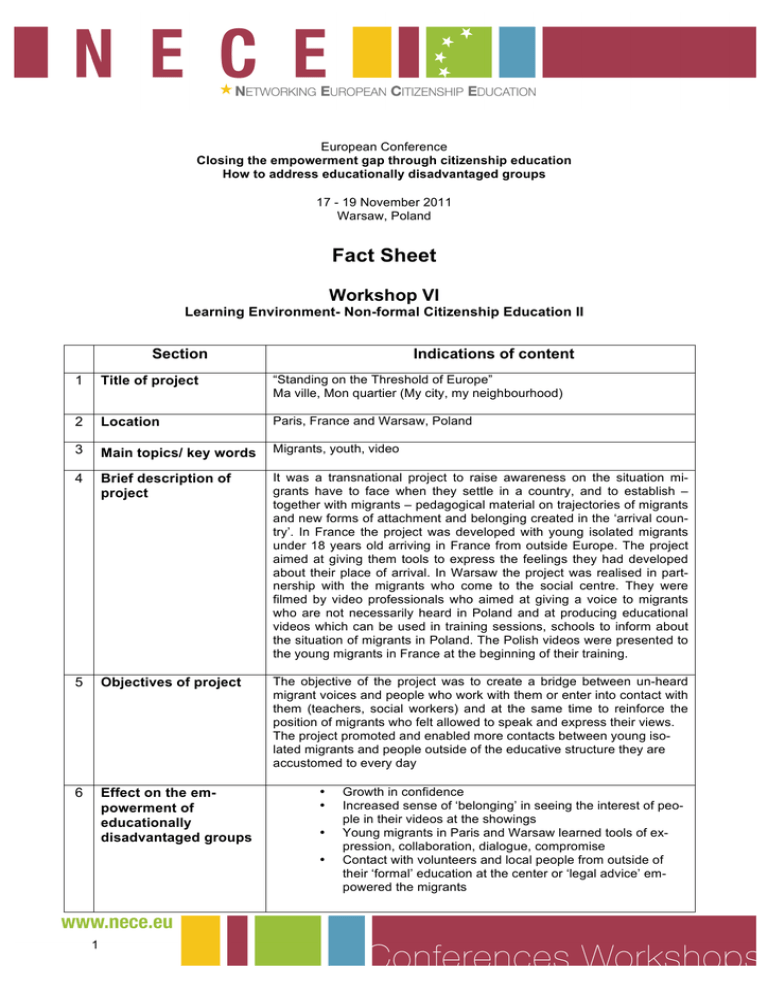
European Conference Closing the empowerment gap through citizenship education How to address educationally disadvantaged groups 17 - 19 November 2011 Warsaw, Poland Fact Sheet Workshop VI Learning Environment- Non-formal Citizenship Education II Section Indications of content 1 Title of project “Standing on the Threshold of Europe” Ma ville, Mon quartier (My city, my neighbourhood) 2 Location Paris, France and Warsaw, Poland 3 Main topics/ key words Migrants, youth, video 4 Brief description of project It was a transnational project to raise awareness on the situation migrants have to face when they settle in a country, and to establish – together with migrants – pedagogical material on trajectories of migrants and new forms of attachment and belonging created in the ‘arrival country’. In France the project was developed with young isolated migrants under 18 years old arriving in France from outside Europe. The project aimed at giving them tools to express the feelings they had developed about their place of arrival. In Warsaw the project was realised in partnership with the migrants who come to the social centre. They were filmed by video professionals who aimed at giving a voice to migrants who are not necessarily heard in Poland and at producing educational videos which can be used in training sessions, schools to inform about the situation of migrants in Poland. The Polish videos were presented to the young migrants in France at the beginning of their training. 5 Objectives of project The objective of the project was to create a bridge between un-heard migrant voices and people who work with them or enter into contact with them (teachers, social workers) and at the same time to reinforce the position of migrants who felt allowed to speak and express their views. The project promoted and enabled more contacts between young isolated migrants and people outside of the educative structure they are accustomed to every day 6 Effect on the empowerment of educationally disadvantaged groups • • • • 1 Growth in confidence Increased sense of ‘belonging’ in seeing the interest of people in their videos at the showings Young migrants in Paris and Warsaw learned tools of expression, collaboration, dialogue, compromise Contact with volunteers and local people from outside of their ‘formal’ education at the center or ‘legal advice’ empowered the migrants th 7 Target Groups Young migrants, local people in the 10 arrondissement of Paris and in Noisy le Sec, migrants in Poland and their local environment – migrants in different countries could relate to each other’s stories through the videos 8 Project methods/ Project format The project methods differ slightly in the two cities: In Paris the young migrants took the camera themselves and chose the shots, music and content of the video – with an insistence on the process more than on the final product; in Warsaw, the migrants co-developed the videos but did not film, with more insistence on the quality and further use of the final product. In both cities preliminary work was conducted with the migrants participating in the project to discuss the objectives of the project, the video tools, the skills they would gain from the project and to develop a concept for their films. 9 Project results/ Project Evaluation/ Materials The project produced four short videos made by the young migrants in France and four videos on ‘living together’ and obstacles faced by migrants in Warsaw, based on the migrants’ own stories. The videos were shown to the public in various public events at Espace Jemmapes and in the annual gathering of people who have been hosted in Noisy le Sec, they were also shown during an event in Warsaw on International Migrants day and during training sessions. The videos are shared through youtube and the website of European Alternatives. DVD versions of the videos given to all participants and send to key stakeholders. 10 Project Duration 1 year and 6 months. 11 Range and sustainability of the project The project had mostly local or regional impact both in France and in Warsaw. The project was sustainable because it is a careful process well integrated in the learning path of the young people. The fact that the videos are used in training sessions for people working with the migrants and unaware of the difficulties they face in Poland also ensures a long lasting impact. 12 Contact information Niccolo Milanese European Alternatives 16 Rue Boursault 75017 Paris France E-Mail: n.milanese@euroalter.com Phone: 0044 7855986831 2 th months. Weekly contact with the participants over 4

